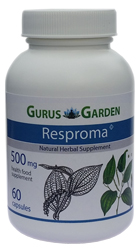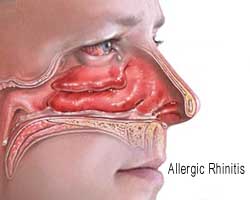
RESPROMA - Natural Herbal Supplement
TRADITIONAL INDICATIONS

- Allergic Rhinitis
- Bronchial Asthma
- Chronic Sinusitis.
- Recurrent Respiratory Infections.
- Tropical Eosinophilia.
- Chronic Obstructive Pulmonary Disease (COPD)
RHINITIS
This occurs when airborne allergens are inhaled. These allergens are harmless unless the body's immune system reacts to them by making antibodies.

Symptoms being frequent sneezing, nasal discharge, irritant cough. This can lead to infections (bronchitis, sinusitis etc,) or bronchospasm (asthma).
ASTHMA
Symptoms are caused by excessive secretions in the bronchi, spasm of smooth muscle in the bronchial wall, and inflammatory swelling of the bronchial lining (mucosa). These changes cause obstruction to airflow in and out of the lung and the increased obstruction during exhalation leads to wheezing and trapping of air in the chest.

The tendency to become allergic is inherited and is controlled by several genes that influence production of IgE antibodies. Allergic disease develops only when a person becomes exposed to those allergens to which he has a genetic predisposition. Perinatal and infantile avoidance of food allergens may postpone development of allergic disease in susceptible children.
A fundamental problem in asthma is irritability of bronchi caused by inflammation in the bronchial walls. The inflammation causes loss of protective epithelial cells from the mucosa (lining of bronchial wall), exposing sensitive nerve endings to the irritating effects of chemical air pollutants and dry air. Predisposition to asthma is inherited, probably as the result of genetic factors independent of allergy-determining genes. Recent research suggests that genes that control various inflammatory mechanisms are important in causing allergic inflammation in the lung.
Allergic reactions in the lung cause inflammation, during which inflammatory cells called eosinophils and lymphocytes are attracted to the bronchial tissues. Products from these cells cause damage to the bronchial lining, which in turn leads to bronchial irritability that persists for several weeks after withdrawal from allergen exposure. This is most likely to occur when there is a delayed response to allergen known as a late phase reaction. Prolonged allergic inflammation in the bronchial walls may lead to thickening of the supportive membrane under the epithelial lining of the bronchial airways, and to a gradual and progressive loss of the ability of the airways to respond to a bronchodilator drug.
How it works:
RESPROMA food supplementis immunomodulatory to the respiratory tract. It helps desensitizes to the antigens and the mucus plugs are thinned out for better expectoration. As no allergy occurs, no subsequent reactions like bronchospasm, stimulation of mucus glands etc. Moreover the primary antioxidant-glutathione is increased with the food supplement RESPROMA that protects and repairs the damaged respiratory mucus membrane.

Initially upper respiratory tract shows symptoms like sneezing, watering in eyes, running nose or throat irritation as foreign body sensation. This can be complicated by sinusitis or ear infection. Later recurrent throat infections with sinusitis continue. Then lower respiratory tract shows symptoms of asthma. This can be complicated by bronchitis, pneumonia, emphysema or even heart involvement.

What is a respiratory allergy?
A respiratory allergy is a specific immunologic response to a normally harmless allergen. These allergies often affect the respiratory system of an individual.

Some common allergens that can cause respiratory allergies:
Pollen
Dust particles
Mold spores
Latex rubber
Medicines
Chemicals
Why do I have allergies while other people don't?
It is believed by researchers that people inherit a tendency to be allergic. However, the tendency itself is inherited, and not linked to any specific substance. For example, your mother may be allergic to pollen, your father allergic to mold spores, while you may be allergic to latex rubber. Although you inherited the tendency to be allergic, you did not inherit the sensitivity to the substances your mother and father were sensitive to.
In rare cases, high exposure to allergens at times when the body's defenses are weakened (such as after a viral infection or during pregnancy) can also contribute to the development of allergies. However, this does not mean that every time you get sick you have a high chance of getting allergies.
What happens when an allergen enters my body?

What are some symptoms of respiratory allergies?
Sneezing (sometimes with runny or clogged nose)
Coughing and postnasal drip
Itching eyes, nose, and throat
Allergic shiners (dark circles under the eyes)
Watering eyes
Conjunctivitis (inflammation of membrane that lines eyelids, causing red-rimmed and swollen eyes, and crusting of the eyelids)
What are pollens?
Pollens are microscopic substances produced by plants for fertilization. Pollens are also the most common allergens. The types of pollen that most commonly cause allergic reactions are produced by common plants such as trees, grasses, and weeds. The pollen granules produced by such plants are specially designed for wind transport. Plants with flowers or other showy features usually do not produce this type of pollen. The pollen grains of these plants (such as roses) are carried by insects, and do not rely on the wind to transport them. Therefore, they rarely reach human noses.
It is common for people to believe that they are allergic to scented flowers, such as roses. In fact, only those who have prolonged exposure to such flowers (such as florists and gardeners) are likely to become sensitive to the pollen of these flowers. This is because the pollen produced by roses is not only heavy and waxy, but also is carried by insects rather than the wind. Therefore, it hardly ever makes contact with a human nose.
How can I avoid pollen allergies?

What are mold allergies?
Molds can generally be found in any moist area that has oxygen and several other minerals. When inhaled, microscopic fungal spores may cause allergic rhinitis. Due to their small size, they often evade the protective structures located in the nose and the upper respiratory tract. In some people, symptoms of mold allergy can be worsened by eating certain foods that are processed with fungi (such as cheese).
The mold season peaks from July to late summer. Although most of them become dormant during the winter, some continue to be active. In the warmer areas of the United States, however, molds thrive all year round, and can cause problems for allergic individuals. Similar to pollen counts, mold counts are also given on weather reports. However, since the presence of spores in the air can change considerably within a period of 24 hours, they are not as useful as pollen counts.
Dust Mite Allergies
Dust Mite Allergies are due to a microscopic organism that lives in household dust. These allergies produce symptoms similar to those of pollen allergy and asthma. Dust Mites are probably the most common cause of perennial allergic rhinitis.
Household dust is a mixture of several potentially allergenic materials:
Fibers (cotton lint, feathers, and other stuffing materials)
Animal dander (cats, dogs)
Bacteria
Molds and fungus spores
Food particles
Microscopic mites
Bits of plants and insects
Microscopic mites often reside in bedding, upholstered furniture, and carpets. They thrive in the summer, but most of them die during the winter. However, there are still many that thrive in humid homes during the winter.
Often, an allergic reaction is caused by dead dust mites and their wastes, or wastes of cockroaches.
Animal Allergies
Animal allergies mostly occur from household pets, such as cats, dogs, and rodents (guinea pigs, gerbils, mice, and rats). The cause of the allergic reaction is from animal dander and protein from their saliva. Cats lick themselves often, depositing the protein on their fur and increasing the chance for an allergic individual of experiencing a reaction. The major source of allergens from rodents is in their urine.
Animal allergies are not immediate, and take up to two or more years to develop. Similarly, symptoms may take six months or more after ending contact with the animal to disappear.
Chemical Sensitivity
Individuals may experience allergic reactions due to any of the following:
Paints
Carpeting
Plastics
Perfumes
Cigarette smoke
Plants
Reactions to these chemicals are not true allergic reactions that involve IgE
RESPROMA is an Ayurvedic preparation that has been used for more than 200 years. RESPROMA has been used for generations and by thousands of people. This is a formula derived and time tested by the Chavarcode Ayurvedic physicians.
For more details visit : http://gurusgarden.com



